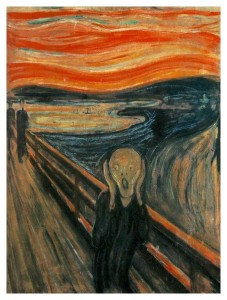Audience favorite Griffin Stanton-Ameisen will play Hamlet for DSF in 2014 and Artistic Director David Stradley will direct the production. Once a month, Griffin and David will be getting together to talk about the play, the character, and all sorts of other things. They’ve agreed to share a short “journal entry” with DSF after each meeting.
October 24, 2013
GRIFFIN STANTON-AMEISEN

Today David and I met with the focus on Act I of Hamlet, as well as relationships, and I also shared some images that spoke to me regarding the play in one way or another.
What has Hamlet been doing for two months since his father passed? When did Gertrude and Claudius get together? Why has Hamlet not tried to escape yet? Or has he? All important given circumstances for Hamlet’s journey heading into the start of the show. Does he go to Ophelia for comfort in grief? Hamlet and Ophelia’s relationship is of huge interest to me as there aren’t that many opportunities to show love, but there is definitely a history and a journey there.
We also discussed Hamlet’s madness as well as Ophelia’s. Their descents are quite different, so how do we earn them and tell the story clearly to the audience? Hamlet’s appears much more calculated, but is it?
The most fascinating question David brought up was, “Why doesn’t Hamlet just go straight for vengeance?” For any person who doesn’t know the play we don’t want to say too much, but suffice it to say, things would’ve been a little different if he took this course of action. This leads to the question of Hamlet’s tragic flaw. Can he just not make up his mind? I don’t think that’s necessarily the case. I think he, like all of us, has his conscience always putting him in check, making him figure out if what he is doing is right. “That would be scanned,” he says. In my life I’m always “scanning” the choices I make. What’s the outcome I want, what could possibly happen, etc.? Why do we do what we do? I think the play is so fascinating because it asks the most human question, to be or not to be…? I won’t say that I have ever seriously considered suicide, but I am always thinking about the why’s. Why am I am an actor? Why do I keep the friends I keep? Why do I get up out of bed every day? And on and on through the endless rabbit hole that exists in all of our minds. And on and on through the endless, beautiful rabbit hole that is this glorious story.
DAVID STRADLEY
Meeting #3! Today, we focused on Act 1 and just asked each other a lot of questions about things that happen in that act.
We wrestled with the question of madness again – why does he decide to put on the display of madness as part of his reaction to the news that his uncle has killed his father? As we termed the question today, “Where does the crazy come from?” It certainly doesn’t help him in his task to revenge his father – in fact, it raises more suspicion of him than people hold before.
At the end of the our coffee chat today we stumbled upon this question, “What is Hamlet’s tragic flaw?” Is it overthinking? If Hamlet goes right to Claudius after the ghost scene and kills him, look at all the people who don’t die. It’s at least seven. But he does think about, he does question it, he does get sidetracked – and all those people do get killed. But don’t we want people thinking about their actions and not just rushing into things? How is carefully considering an action a bad thing? If that is Hamlet’s tragic flaw, it’s a great one because it’s one we all can relate to.
Other fun questions we stumbled upon today:

What keeps Hamlet from leaving Elsinore to go back to Wittenberg?
Why does Claudius want Hamlet to stay?
Does Hamlet believe in ghosts?
Does Gertrude marrying Claudius change Hamlet’s opinion of all women, particularly Ophelia?
We shared artwork with each other that spoke to us about the play. Griffin shared Munch’s The Scream as well as some interesting photograph of broken glass and watery mirrors. I shared the sculptures and images of Albert Giacometti. We looked at the intense portraits of Chuck Close.
And finally, we started talking about cuts. We’re going to have to cut a lot. Full running time would easily be 4 hours. Most modern productions run about 2:45 or 3 hours. We want DSF’s to run about 2 hours or 2:15. We know we’re going to lose a lot of good text. It’s making careful choices so the cuts create a dramatic energy, and a clear sense of story even though will be cutting almost half of the play. DSF shows have always run close to two hours. Nothing says summer fun like being outside for a 3 1/2 hours play, so we need to trim! That will be a lot work.
OTHER GRIFFIN & DAVID JOURNAL ENTRIES
One Last Time
May 2014
April 2014
March 2014
February 2014
December 2013
November 2013
September 2013
August 2013




